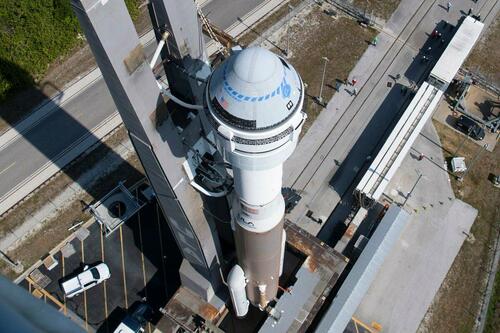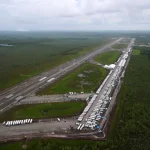
After a nearly one-month delay, NASA and Boeing are moving forward with the CST-100 Starliner launch despite a helium leak. This crewed mission will mark the first time the spacecraft ferries astronauts to the International Space Station.
On Friday, NASA and Boeing officials told reporters that a problematic valve was replaced after the scrubbed May 6 launch attempt. Shortly after, engineers found a "small" helium leak with Starliner.
NASA Associate Administrator Ken Bowersox said, "It's taken a while for us to be ready to discuss" the helium leak problem.
"It's so complicated. There are so many things going on. We really just needed to work through it as a team," Bowersox said.
NASA and Boeing say a defective seal caused the leak in one of the flanges of the spacecraft's helium propulsion system. It was not immediately clear whether the seal was installed improperly or manufactured incorrectly.
Steve Stich, the manager of NASA's Commercial Crew Program, explained the Starliner can still fly with the helium leak:
"Should we be wrong about something, we could handle up to four more leaks.
"And we could handle this particular leak if that leak rate were to grow, even up to 100 times in this one (propulsion module)."
Stich pointed out that NASA has "flown vehicles with small helium leaks" before, including "a couple of cases" from Elon Musk's SpaceX's rockets.
Another review of the leak is slated for Wednesday. The rocket and capsule are set to be rolled out onto the launch pad at Cape Canaveral Space Force Station in Florida on Saturday.
After a nearly one-month delay, NASA and Boeing are moving forward with the CST-100 Starliner launch despite a helium leak. This crewed mission will mark the first time the spacecraft ferries astronauts to the International Space Station.
On Friday, NASA and Boeing officials told reporters that a problematic valve was replaced after the scrubbed May 6 launch attempt. Shortly after, engineers found a “small” helium leak with Starliner.
NASA Associate Administrator Ken Bowersox said, “It’s taken a while for us to be ready to discuss” the helium leak problem.
“It’s so complicated. There are so many things going on. We really just needed to work through it as a team,” Bowersox said.
NASA and Boeing say a defective seal caused the leak in one of the flanges of the spacecraft’s helium propulsion system. It was not immediately clear whether the seal was installed improperly or manufactured incorrectly.
Steve Stich, the manager of NASA’s Commercial Crew Program, explained the Starliner can still fly with the helium leak:
“Should we be wrong about something, we could handle up to four more leaks.
“And we could handle this particular leak if that leak rate were to grow, even up to 100 times in this one (propulsion module).”
Stich pointed out that NASA has “flown vehicles with small helium leaks” before, including “a couple of cases” from Elon Musk’s SpaceX’s rockets.
Another review of the leak is slated for Wednesday. The rocket and capsule are set to be rolled out onto the launch pad at Cape Canaveral Space Force Station in Florida on Saturday.
Loading…





